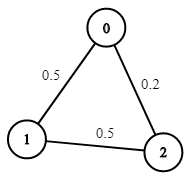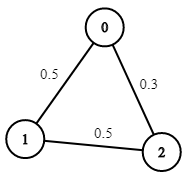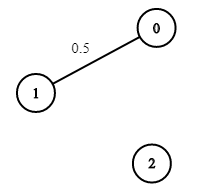1514. Path with Maximum Probability
Description
You are given an undirected weighted graph of n nodes (0-indexed), represented by an edge list where edges[i] = [a, b] is an undirected edge connecting the nodes a and b with a probability of success of traversing that edge succProb[i].
Given two nodes start and end, find the path with the maximum probability of success to go from start to end and return its success probability.
If there is no path from start to end, return 0. Your answer will be accepted if it differs from the correct answer by at most 1e-5.
Example 1:

Input: n = 3, edges = [[0,1],[1,2],[0,2]], succProb = [0.5,0.5,0.2], start = 0, end = 2 Output: 0.25000 Explanation: There are two paths from start to end, one having a probability of success = 0.2 and the other has 0.5 * 0.5 = 0.25.
Example 2:

Input: n = 3, edges = [[0,1],[1,2],[0,2]], succProb = [0.5,0.5,0.3], start = 0, end = 2 Output: 0.30000
Example 3:

Input: n = 3, edges = [[0,1]], succProb = [0.5], start = 0, end = 2 Output: 0.00000 Explanation: There is no path between 0 and 2.
Constraints:
2 <= n <= 10^40 <= start, end < nstart != end0 <= a, b < na != b0 <= succProb.length == edges.length <= 2*10^40 <= succProb[i] <= 1- There is at most one edge between every two nodes.
Solutions
Solution: Dijkstra's Algorithm
- Time complexity: O(nlogn)
- Space complexity: O(n)
JavaScript
js
/**
* @param {number} n
* @param {number[][]} edges
* @param {number[]} succProb
* @param {number} start_node
* @param {number} end_node
* @return {number}
*/
const maxProbability = function (n, edges, succProb, start_node, end_node) {
const graph = new Array(n)
.fill('')
.map(_ => []);
const probs = new Array(n).fill(0);
const queue = new MaxPriorityQueue({ priority: ({ prob }) => prob });
for (const [index, [a, b]] of edges.entries()) {
graph[a].push({ node: b, prob: succProb[index] });
graph[b].push({ node: a, prob: succProb[index] });
}
probs[start_node] = 1;
queue.enqueue({ node: start_node, prob: 1 });
while (queue.size()) {
const { node, prob } = queue.dequeue().element;
for (const arrive of graph[node]) {
const nextProb = arrive.prob * prob;
if (nextProb <= probs[arrive.node]) continue;
probs[arrive.node] = nextProb;
queue.enqueue({ node: arrive.node, prob: nextProb });
}
}
return probs[end_node];
};